In recent political discourse, a notable conversation has emerged surrounding the independence of the Federal Reserve (Fed) and its potential governance by the President. The dialogue intensified with comments made by space exploration magnate and Tesla CEO Elon Musk, who publicly supported a proposition by Senator Mike Lee (R-Utah). This commentary reflects a growing trend where influential corporate leaders, like Musk, are weighing in on significant economic policy decisions traditionally insulated from political maneuvering.
Musk’s endorsement, albeit through a fleeting social media post comprising only of a “100” emoji, indicates a pivotal shift in the expected governance of the Fed. Senator Lee’s call to place the Fed under presidential authority, highlighted by the hashtag “#EndtheFed,” signals a broader movement among some political figures seeking to diminish the Fed’s independence. This raises critical questions regarding the long-standing role of economic institutions in a democratic society and their relationship with elected officials.
The Federal Reserve is designed to function independently to craft monetary policies free from political pressures, enabling the bank to maneuver economic tools—like setting interest rates—based on economic forecasts, rather than the whims of political agendas. However, this concept has been challenged in the past, particularly during Trump’s presidency, when he publicly criticized Jerome Powell, the sitting Fed Chair, over policy decisions that he deemed unfavorable to his administration. Such conflicts have the potential to undermine the credibility of the Fed and alter public perceptions of its authority.
With Trump hinting at a more significant presidential involvement in monetary policy during his recent campaign, a debate around the necessity of maintaining an independent central bank has reignited. Trump asserted, “I feel the president should have at least [a] say in there,” which embodies a growing sentiment among his supporters and the potential to shape economic policy discussions in a future administration.
The possible clash between the executive branch and the Federal Reserve conjures concerns about the ramifications of politicized monetary policy. Economists and political analysts warn that a direct presidential influence over the Fed might lead to short-term thinking in economic strategies, potentially prioritizing market performance over long-term fiscal stability. This could instigate market volatility, undermine economic confidence, and risk inhibiting the Fed’s ability to respond effectively to financial crises.
Moreover, Musk’s involvement highlights how corporate leaders might shape political narratives, raising ethical questions about their role in influencing public policy. As business titans like Musk increasingly enter the political arena, their viewpoints on monetary policy not only reflect personal ideologies but also resonate with a broader constituency that may lack a nuanced understanding of economic governance.
A Call for Critical Reflection
As the dialogue around Fed independence continues, both voters and policymakers must critically analyze the implications of intertwining economic institutions with political influence. The concerns surrounding potential shifts in policy must drive a revisit to foundational principles that uphold the efficacy and credibility of monetary governance. The outcome of this ongoing debate will undoubtedly shape the future landscape of American economic policy, necessitating vigilant oversight and strategic governance to ensure a balanced approach between independence and accountability.


Leave a Reply